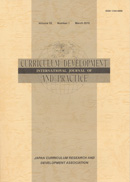This article discusses the organizational and personal development in subject didactics as a particular field of social science research. Assuming the growing importance of subject didactics as a new field of research, the author invites to pay more attention to the interdependency of three components in the developmental process of a scientific discipline: 1. the personal development, 2. the knowledge management and 3. the organizational development. On the example of the first project, the article provides insight into the developmental process - conceptualization, implementation and institutionalization - of small organizational units, the ‘Centres of Subject Didactics’, which were established between 2001 and 2013 in the framework of teacher education studies at the University of Vienna. This process led to the allocation of manpower, of funds and of rooms provided by the university. The second component of the ‘developmental triangle’, the personal development of the research staff, is illustrated on the example of the research platform ‘Theory and Practice of Subject Didactics’. The four years’ interdisciplinary and transdisciplinary project (2009-2012) helped to improve and standardize theory building and methodological competence among the scholars working in subject didactics. The longterm process of cooperation and communication among scholars working in the field contributed to the differentiation of research questions, made the research dimension of the subject didactics apparent and helped to strengthen the identity of both, the identity of subject didactics as a new field of research, and the identity of the scholars involved who got a clearer understanding of their role as ‘subject didacticians’.
View full abstract
